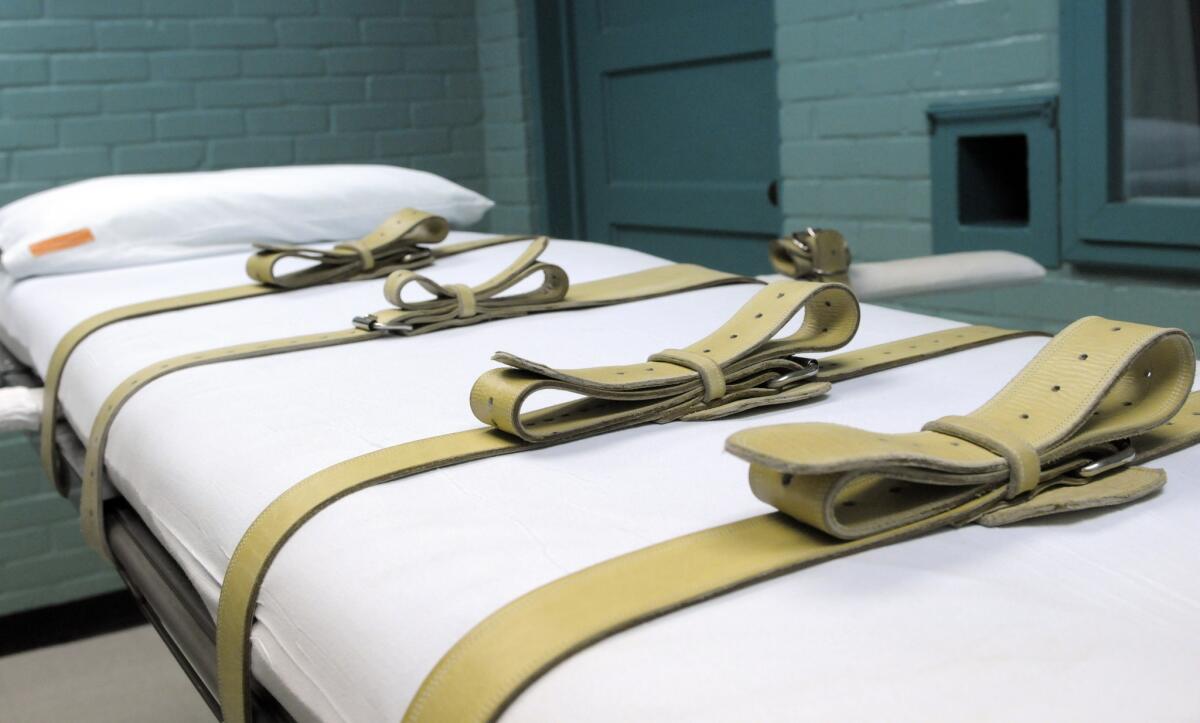Editorial: 2019 has given us yet more examples of the inherent injustice of capital punishment

- Share via
Since the beginning of the year, seven states have executed 19 men convicted of murder. That ranks among the lowest annual execution totals since the practice resumed in 1976 after a U.S. Supreme Court decision, according to statistics maintained by the Death Penalty Information Center. But it’s only November, so there’s still time for more. In fact, Georgia has scheduled an execution for Wednesday, and Texas has one set for a week later.
And after a 16-year hiatus, the federal government plans to resume executions next month by killing Daniel Lewis Lee, one of two white supremacists convicted of the 1996 murders of a married Arkansas couple and their 8-year-old daughter. The other person convicted in that case, Chevie Kehoe, who by most accounts was the instigator of the violence, received a life sentence. That disparity is a microcosm of one of the key flaws of capital punishment: It is fundamentally arbitrary in its application. Two men were convicted of the same murder; one was more deeply responsible, yet the other received the harsher sentence.
In fact, this year’s executions contain several sterling examples of why the nation needs to abandon this appalling practice, which is handed down unfairly and meted out at times on people who may have been innocent.
In August, Texas executed Larry Swearingen despite the fact that jurors heard debunked, misleading and likely erroneous testimony from supposedly expert prosecution witnesses that purported to link Swearingen to the murder weapon, eliminated another possible suspect and contradicted Swearingen’s contention that he was in police custody at the time of the victim’s death.
Earlier, Alabama executed Domineque Ray based largely on testimony by an alleged accomplice who prosecutors knew, but didn’t disclose, suffered from schizotypal disorder, a mental illness that can include hallucinations and delusions. And just two weeks ago, South Dakota executed Charles Rhines after he was sentenced to death by a jury that discussed whether sending Rhines, who was gay, to a men’s prison for life would be more reward than punishment. Rhines never received a judicial review of whether that blatant prejudice unfairly led to the death penalty.
In the upcoming Georgia execution of Ray Cromartie, questions linger over whether he indeed was the triggerman in a robbery-murder, or whether the gun was fired by an accomplice who accepted a plea bargain and has already finished his sentence.
In the Texas execution scheduled for next month, lawyers for the Innocence Project say they have new evidence calling into question the guilt of Rodney Reed, sparking calls (including by celebrity activists Kim Kardashian West and rapper Meek Mill) for a delay to give his lawyers time to complete his appeals.
Each of these cases, of course, hinges on the details of evidence specific to the crime. But taken together, they reveal a persistent problem with capital punishment: There is no way to guarantee we won’t execute the innocent, or that the death penalty will not fall arbitrarily among the guilty. Historically, the death penalty has been disproportionately doled out to minorities, the poor and the mentally ill — and not limited, as death penalty advocates argue they have been, to “the worst of the worst.” That’s atrocious and defies any commonly understand sense of justice.
More to Read
A cure for the common opinion
Get thought-provoking perspectives with our weekly newsletter.
You may occasionally receive promotional content from the Los Angeles Times.










